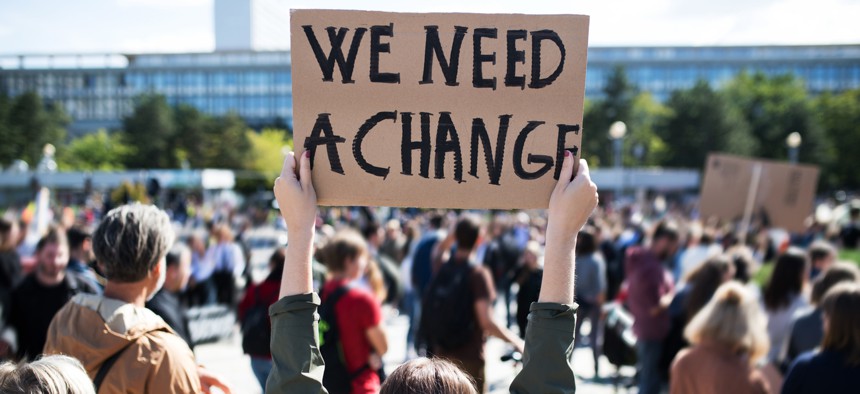
Shutterstock.com
Your Security Clearance and Protests: What You Need to Know
You’re free to take to the streets or social media with your concerns—just don’t get arrested.
The protests of the past several weeks have had specific implications for government and national security workers. Not only are many asking if they’ll lose their job if they take to the streets (short answer: no), many are also asking if they may lose their security clearance. Previous legal action related to security clearances supports the government posture that a security clearance is a privilege, not a right. Security clearance holders lose their ability to tank their finances or gamble their savings away or use drugs—even where such use may be legal under local laws. But they don’t lose their ability to peacefully assemble and protest the very government they support.
“Although security clearance holders voluntarily agree to some limitations on their First Amendment rights—for example, they agree to submit for review any work prior to publication—they do maintain their First Amendment rights to peacefully gather and protest,” said Sean Bigley, partner, Bigley Ranish LLP. “No clearance holder should worry about losing his or her clearance for exercising those fundamental rights. But the key word here is peacefully. If a clearance-holder is engaging in violence, looting, or otherwise acting unlawfully—including refusing to disperse after an assembly has been declared unlawful or violating a curfew—he or she could be subject to adverse action against their clearance in addition to any criminal penalties.”
Guideline A: Allegiance to the United States is one of the adjudicative criteria used to determine security clearance eligibility. While continuous vetting has created a few more flags for potential allegiance issues, it is incredibly rare for Guideline A issues to result in security clearance denial. A single denial was issued by the Department of Defense in 2019, and related to an individual’s prior leadership in a white supremacist organization. Attending a peaceful protest or supporting a cause, even if it appears in contradiction with the government, is not a reason for clearance denial. Even for the most clandestine cleared workers, freedom of speech still exists.
"The reality is that one's political persuasion is a topic which hardly ever percolates to the top within the CIA workforce,” said Christopher Burgess, a 30-year CIA veteran and current contributor to ClearanceJobs.com. “Yes, the director is appointed by the President, and the CIA is part of the Executive Branch. From my seat, it's as apolitical an organization as one can find in government, and in my 30 plus years I couldn't tell you what party any of my colleagues backed. With respect to protesting, one should hit the streets if one feels strongly about a topic, keeping in mind not to violate any laws. Getting yourself arrested, even for a misdemeanor, invites a review of your suitability to hold a security clearance, and who needs that."
When it comes to protesting issues, then, the takeaway is to be smart and follow the law. If a protest is shut down by police or violates a locally instituted curfew, your issue isn’t the fact you were at a protest, but any subsequent citations or legal actions caused by your protest activity.
In addition to avoiding criminal conduct, keep in mind any Hatch Act restrictions on political speech. Don’t wear identifying clothing or badges to protests, and if you’re an active duty service member, leave the uniform at home.
What Continuous Vetting May Catch
Continuous vetting is rolling out to more cleared candidates this year, and many are left wondering if their social media posts will be pulled in with online records checks the government is making. Thus far, social media posts have not been seen used in security clearance denial cases, but with the policy available to support it, it’s only a matter of time. Your freedom of speech still applies to your online postings, but the court has argued that you can’t knowingly publish and promote false information. With social media a relative feeding frenzy of foreign intelligence agents looking to spread disinformation, national security workers must be particularly careful that what they are posting is accurate. It’s a high bar to prove a social media post attempted to deliberately misinform, but why take the chance?
Whether you work for the CIA or the Department of State, your security clearance is not put into jeopardy by supporting a cause you believe in. Just make sure you don’t run afoul of the law while you protest—whether it’s a curfew or coronavirus restrictions—and your security clearance will be fine.






